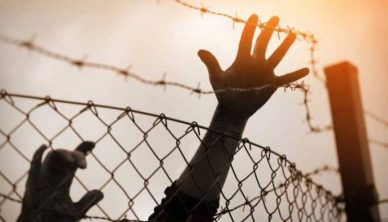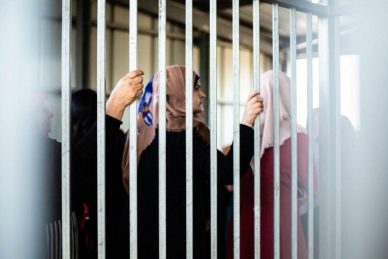RAMALLAH, (PIC)
As the blessed month of Ramadan started, the Israeli occupation prisons continue their policy of starvation against more than 9,100 prisoners since October 7th, including women, children, and the sick, alongside restricting their religious practices such as prayer, call to prayer, and Quran recitation.
The Palestinian Prisoner Society (PPS) said in a Monday statement that the policy of starvation has worsened significantly after October 7th due to a series of measures, including the closure of the so-called prisoners’ canteens, confiscation of remaining food supplies, and reducing meal portions.
The PPS added that the food provided to prisoners is both insufficient and of poor quality, affecting their health, particularly the sick among them, and exacerbating their conditions. Thousands of detainees have been thrown into cells after October 7th without enough food, exacerbating the starvation policy.
The starvation policy, along with torture and abuse, has become one of the most dangerous policies imposed by Israel after October 7th, causing health problems, especially digestive issues, and significant weight loss among all prisoners. Released prisoners’ photos show severe weight loss among many.
Food issues have become prominent in prisoners’ testimonies recently. Apart from the poor quality and quantity of food provided by prison authorities, they deliberately bring poorly cooked food.
In some prisons and detention camps, particularly those under military administration like Ofer, expired canned food was given to detainees.
Deprivation of religious practices
In addition to the starvation policy, prison authorities deprived prisoners of the call to prayer and congregational prayers even within cells. Prisoners have been assaulted multiple times for attempting to pray or read the Quran audibly.
Many prisons, including Negev, confiscated copies of the Holy Quran from prisoners initially after the aggression. Prisoners also face difficulties in performing ablution due to the limited water supply.
With unprecedented collective isolation imposed on prisoners, stripping them of any means of communication with the outside world including radios and limited TV stations available to them before October 7th, thousands find it challenging to even know prayer times within cells.
Death due to poor food
The case of the martyr prisoner Mohammed Ahmed Al-Sabar, who was held administratively, is one of the prominent cases associated with the starvation policy and poor food. He suffered from intestinal problems before his arrest, needing special food and medical follow-up.
The food, primarily pulses, caused severe bloating in his intestines, worsening his health until his death on February 8th. The Israeli occupation authority continues to detain his body.
Humiliation and starvation against Gaza detainees
Due to the ongoing enforced disappearance crime against Gaza detainees, there is insufficient information about the food they receive as part of their detention conditions.
However, according to testimonies from released detainees, they suffered from starvation policy and deliberate humiliation to obtain food. Among what released prisoners reported is that prison authorities ask Gaza detainees to bark when bringing meals.
The number of prisoners in Israeli prisons exceeds 9,100, including 3,558 administrative detainees, around 200 children, and 61 female prisoners.












